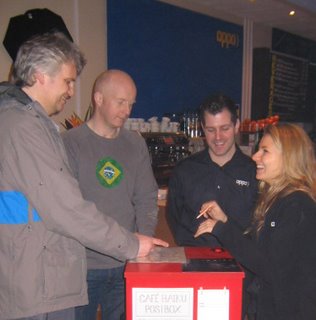 |
| Alan Summers outside The Poet Hotel, Amsterdam, Museum Quarter photo by Karen Hoy |
Alan Summers, haiku writer-in-residence at the Bristol Festival of Literature 2015
Our resident haiku expert, Alan Summers, will be on hand to help while you have a go at writing haiku on the theme of ‘Nature’.
Write your haiku on bunting triangles that will gradually be displayed in the space throughout the weekend, filling the room with poetry and inspiration.
Saturday and Sunday
17th and 18th October 2015
11am - 2pm
The Green Lab
Bristol Harbourside
just down from Watershed
and before Millennium Square
Time: 11:00am - 2:00pm
Where: The Green Lab
The theme is nature:
Ask me about haiku, and have a go. I’m available to help out in a friendly manner!
Alan is a Japan Times award-winning writer, and author of the forthcoming book Writing Poetry: the haiku way. A Pushcart Prize nominated poet he also appears in various leading haiku anthologies, including Haiku in English: The First Hundred Years (W. W. Norton 2013), and recently on NHK World (Japanese television).
Look for the Hanging Bike, and The Stable:
Haiku about Nature
 |
| shahai artwork by Alan Summers 2015 |
sidewalk crack
we hopscotch
and salute the flower
Alan Summers
Brass Bell: the HAPPINESS issue (October 2015)
*
mistfall
the swansongs
of orb spiders
Alan Summers
Scope (FAWQ magazine July 2015 vol. 61 no. 6)
*
dandelion fluff
I lose count of my time
on this earth
Publication Credit:
Brass Bell: A Feature on Alan Summers July, 2015
*
dark news
the comfort
of crows
Alan Summers
tiny words 15.1 (March 31st 2015)
*
old tales
moon-bright leaves
jostle the breeze
Alan Summers
Wild Plum 1:1 (Spring & Summer 2015)
*
splitting the sky
a kingfisher lifts a branch
off the breeze
Alan Summers
Best of Mainichi 2014 (Japan)
*
first dream-
a blackbird whispers
its song to the rain
Alan Summers
Scope vol. 60 no. 9 (FAWQ magazine October 2014
*
wet prints
the sun takes the dog
elsewhere
Alan Summers
hedgerow: a journal of small poems (Issue 1, September 2014)
*
after rain midnight dreams a hedgehog
Alan Summers
brass bell: a haiku journal
One-Line Haiku curated by Zee Zahava (Monday, September 1, 2014)
*
hard frost-
the snail-hammerings
of a song thrush
Alan Summers
Muttering Thunder vol. 1, 2014
*
the names of rain
a blackbird’s subsong
into dusk
Alan Summers
a blackbird’s subsong
into dusk
Alan Summers
Publication Credit:
Hailing Foxes and other wild things
illustrated by Dru Marland
Hailing Foxes and other wild things
illustrated by Dru Marland
The festival celebrates its 5th Year!
Bristol Festival of Literature 2015
Thursday October 15th – Saturday 24th 2015








